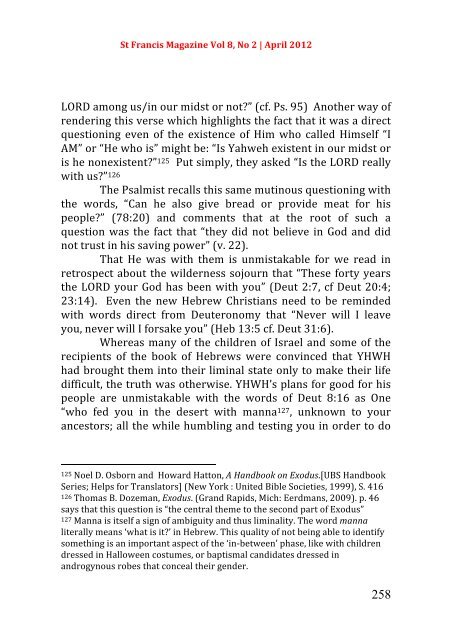Untitled - St.Francis Magazine
Untitled - St.Francis Magazine
Untitled - St.Francis Magazine
Create successful ePaper yourself
Turn your PDF publications into a flip-book with our unique Google optimized e-Paper software.
<strong>St</strong> <strong>Francis</strong> <strong>Magazine</strong> Vol 8, No 2 | April 2012 LORD among us/in our midst or not?” (cf. Ps. 95) Another way of rendering this verse which highlights the fact that it was a direct questioning even of the existence of Him who called Himself “I AM” or “He who is” might be: “Is Yahweh existent in our midst or is he nonexistent?” 125 Put simply, they asked “Is the LORD really with us?” 126 The Psalmist recalls this same mutinous questioning with the words, “Can he also give bread or provide meat for his people?” (78:20) and comments that at the root of such a question was the fact that “they did not believe in God and did not trust in his saving power” (v. 22). That He was with them is unmistakable for we read in retrospect about the wilderness sojourn that “These forty years the LORD your God has been with you” (Deut 2:7, cf Deut 20:4; 23:14). Even the new Hebrew Christians need to be reminded with words direct from Deuteronomy that “Never will I leave you, never will I forsake you” (Heb 13:5 cf. Deut 31:6). Whereas many of the children of Israel and some of the recipients of the book of Hebrews were convinced that YHWH had brought them into their liminal state only to make their life difficult, the truth was otherwise. YHWH’s plans for good for his people are unmistakable with the words of Deut 8:16 as One “who fed you in the desert with manna 127 , unknown to your ancestors; all the while humbling and testing you in order to do 125 Noel D. Osborn and Howard Hatton, A Handbook on Exodus.[UBS Handbook Series; Helps for Translators] (New York : United Bible Societies, 1999), S. 416 126 Thomas B. Dozeman, Exodus. (Grand Rapids, Mich: Eerdmans, 2009). p. 46 says that this question is “the central theme to the second part of Exodus” 127 Manna is itself a sign of ambiguity and thus liminality. The word manna literally means ‘what is it?’ in Hebrew. This quality of not being able to identify something is an important aspect of the ‘in-‐between’ phase, like with children dressed in Halloween costumes, or baptismal candidates dressed in androgynous robes that conceal their gender. 258







![Reflections on Surah Fatiha and the Lord's Prayer[1] - St.Francis ...](https://img.yumpu.com/49377951/1/184x260/reflections-on-surah-fatiha-and-the-lords-prayer1-stfrancis-.jpg?quality=85)








